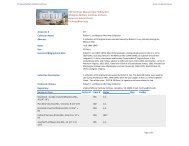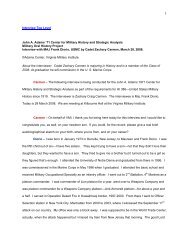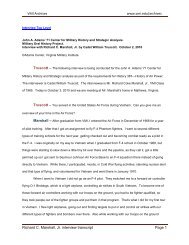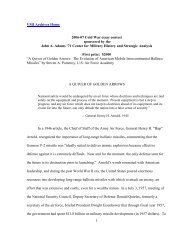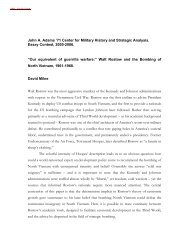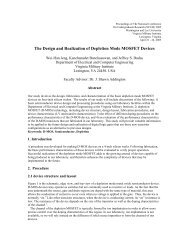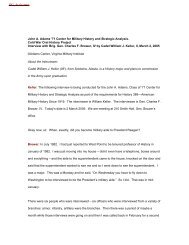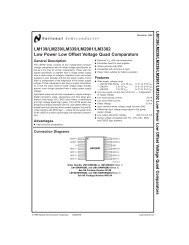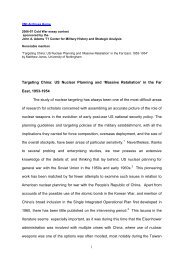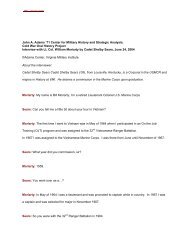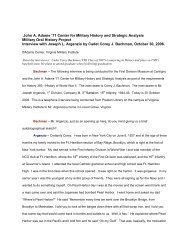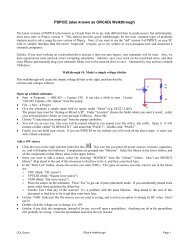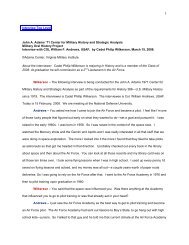Academic Catalog - Virginia Military Institute Admissions
Academic Catalog - Virginia Military Institute Admissions
Academic Catalog - Virginia Military Institute Admissions
You also want an ePaper? Increase the reach of your titles
YUMPU automatically turns print PDFs into web optimized ePapers that Google loves.
<strong>Virginia</strong> <strong>Military</strong> <strong>Institute</strong><br />
12-13 <strong>Catalog</strong>ue<br />
ceramic, polymer, and composite materials. Material stress-strain diagrams, fatigue, creep,<br />
phase diagrams and heat treatment diagrams will be emphasized.<br />
ME 201. STATICS 3—0—3<br />
Vector and scalar methods in the composition and resolution of forces; moments of forces;<br />
equilibrium in two or three dimensions; simple structures including trusses and frames;<br />
shear and moment in beams; distributed loads; friction; centroids and centers of gravity.<br />
Corequisite: MA 124 unless previously completed.<br />
ME 203. PROGRAMMING TOOLS FOR MECHANICAL ENGINEERS 1—2—2<br />
Programming fundamentals and introductory instruction in the use of mathematical<br />
application software. Focus will be upon problem solving techniques and logical solution<br />
development.<br />
ME 206. SOLID MECHANICS 3—0—3<br />
A study of the behavior of non-rigid bodies when subjected to external tension, compression,<br />
bending, torsional loads, or combination of these loads. Development of mathematical<br />
expressions that relate external loads, member properties, and internal stresses, strains,<br />
and deflections. Includes elastic and plastic stress theory. Prerequisites: MA 124, ME 109,<br />
ME 110 and a grade of C or higher in ME 201.<br />
ME 243/244 ME DESIGN COMPETITION PARTICIPATION 0—1—0.5<br />
Participation in a student design team competition team for underclassmen. Prerequisite:<br />
Permission of a team adviser.<br />
ME 255-256. SUMMER RESEARCH 0—2—1 to 0—6—3<br />
ME 355-356. SUMMER RESEARCH 0—2—1 to 0—6—3<br />
ME 455-456. SUMMER RESEARCH 0—2—1 to 0—6—3<br />
Offered to mechanical engineering cadets engaged in summer research. Prerequisite:<br />
Permission of department head.<br />
ME 302. DYNAMICS 3—0—3<br />
Vector and scalar methods in kinematics, including absolute and relative motion of particles<br />
and rigid bodies; kinetics, with solutions of rigid bodies by the methods of force, mass and<br />
acceleration, work and energy, and impulse and momentum. Prerequisite: ME 201.<br />
ME 311. THERMODYNAMICS I 3—0—3<br />
A study of the first and second laws of thermodynamics; basic energy concepts; the<br />
properties of liquids and vapors including enthalpy and entropy; ideal gas concepts and<br />
relationships. Prerequisite: MA 124 and ME 203.<br />
ME 313. THERMODYNAMICS II 3—1—3.5<br />
Gas-vapor mixtures, psychrometry and air conditioning process; real and ideal power,<br />
refrigeration, heat pump, and air compression cycles; fuels and combustion processes; energy<br />
system design and computer applications; laboratory experience to reinforce theoretical<br />
concepts to include engineering team experience and report writing. Prerequisite: A grade<br />
of C or higher in ME 331.<br />
ME 314. FLUID MECHANICS 3—1—3.5<br />
Elementary mechanics of fluids. fluid properties; hydrostatics; fluid kinematics; equations of<br />
motion; energy equation; momentum principles; flow of liquids and gases in closed conduits;<br />
compressible flow; principles of dimensional analysis and dynamic similitude; laboratory<br />
experience to reinforce theoretical concepts to include engineering team experience and<br />
report writing. Prerequisite: MA 124, ME 201, ME 311.<br />
ME 321. DYNAMICS OF MACHINERY 3—0—3<br />
Application of kinematics and dynamics to the design of mechanical components. Analysis<br />
and synthesis of the relationship between machine forces and motions. Prerequisite: ME 302.<br />
ME 322. MECHANICAL ANALYSIS AND DESIGN 3—0—3<br />
Review of stress and stiffness analysis. Introduction to failure theories, fatigue, finite<br />
elements, and material selection as it pertains to design of machine elements. Prerequisite:<br />
A grade of C or higher in ME 206.<br />
ME 325. INSTRUMENTATION LABORATORY 1—2—2<br />
Measurement of temperature, pressure, flow, strain, stress, force, velocity and displacement.<br />
Interpretation of data curve fitting, statistics. Signal conditioning, digital data acquisition,<br />
data recording. Static and dynamic systems. Prerequisite: WR 102 and ME 203.<br />
ME 336. HEAT AND MASS TRANSFER 3—1—3.5<br />
Fundamental principles of heat transfer by conduction, convection, and radiation are<br />
examined. Provides an introduction to mass transfer. Contains elements of design of fins and<br />
composite walls. Finite difference techniques are introduced. Includes laboratory experience<br />
to reinforce theoretical concepts to include engineering team experience and report writing.<br />
Prerequisites: ME 311 and MA 311.<br />
ME 342. ANALYSIS AND CONTROL OF DYNAMIC SYSTEMS 3—0—3<br />
Analysis of dynamic system in both the time and frequency domain, with application to the<br />
design of basic feedback control systems. Mechanical, electrical, thermal, and fluid systems<br />
are considered. Topics include transfer function determination, frequency response, error<br />
analysis, root locus techniques, stability analysis, linear and non-linear systems. Prerequisite:<br />
MA 311 and EE 351.<br />
ME 343/344 ME DESIGN COMPETITION PARTICIPATION 0—1—0.5<br />
Participation in a student design team competition team for underclassmen. Prerequisite:<br />
Permission of a team adviser.<br />
ME 412. SOLAR ENERGY 3—0—3<br />
A study of energy resources, consumption, policies and possible future energy scenarios<br />
of the U.S.A. and the world. The study and practices of energy conservation principles<br />
coupled to economic considerations. An in-depth investigation of Sun-Earth geometric<br />
relations and calculations of extraterrestrial and terrestrial instantaneous and long-term solar<br />
radiation on surfaces. The study of thermal characteristics of buildings related to passive<br />
and superinsulation design technologies. The analysis and design of solar systems including<br />
solar collector domestic hot water systems. A number of computer-aided design projects<br />
are assigned during the course. Prerequisites: ME 311.<br />
ME 413. AIRCRAFT PROPULSION SYSTEMS 3—0—3<br />
Design and analysis of atmospheric propulsion engines and systems. Thermodynamics,<br />
combustion fundamentals, turbo machinery and the aerothermodynamics of inlets, diffusers,<br />
combustors, and nozzles as related to the design of gas turbine and rocket engines and<br />
components. Matching of propulsion system to vehicle requirements. Prerequisite: ME 313.<br />
ME 414. TURBOMACHINERY 3—0—3<br />
Theory and performance characteristics bearing on the design of fluid dynamic machines<br />
such as centrifugal and axial flow pumps, fans, compressors, and turbines. Prerequisites:<br />
ME 314 and ME 311.<br />
ME 415. FLIGHT MECHANICS 3—0—3<br />
Properties of the earth’s atmosphere. Aerodynamic parameters, generation of lift, airfoils<br />
and wing theory. Boundary layer, aerodynamic drag. Aircraft performance: climb, range and<br />
endurance. Introduction to stability and control. Prerequisite: 2nd class standing or higher.<br />
ME 416. FUNDAMENTALS OF AERODYNAMICS 3—0—3<br />
Introduction to differential analysis of fluid motion, incompressible external inviscid flow,<br />
incompressible external viscious flow, steady one-dimensional compressible flow: Fanno<br />
Line Flow, Rayleigh Line Flow, Normal Shocks. Prerequisites: ME 311 and ME 314.<br />
ME 417. AIRCRAFT STRUCTURAL ANALYSIS 3—0—3<br />
Introduction to the linear, static structural behavior relating to aircraft design. Classical<br />
methods of analysis will be applied to practical problems. Prerequisites: ME 201 and ME 206.<br />
ME 418. THERMAL ENVIRONMENT ENGINEERING 3—0—3<br />
Analysis and synthesis of systems to produce control of the thermal environment of<br />
enclosures for human occupancy, processes of special equipment. Psychrometrics of air,<br />
heating and cooling load calculations, and systems design. Prerequisite: ME 311.<br />
ME 419. THERMAL-FLUID SYSTEMS DESIGN 3—2—4<br />
Application of thermodynamics, fluid mechanics and heat transfer to energy conversion<br />
processes. Design of engines, heat exchangers, compressors, valves, fans, blowers, vessel<br />
design, and power and refrigeration cycles. Prerequisite: ME 313, ME 314, ME 336.<br />
ME 425. MECHANICAL DESIGN 3—2—4<br />
Design of mechanical components subject to static and fatigue loads. Practical design<br />
and applications of materials to power screws, fasteners, springs, bearings, gears, chains,<br />
and belts. Design of power transmissions. Introduction to the finite element method.<br />
Prerequisite: ME 322.<br />
ME 427. INTRODUCTION TO AUTOMATED MANUFACTURING SYSTEMS 2—2—3<br />
Introduction to computer-aided manufacturing. Familiarization with standard manufacturing<br />
processes. Study of commercial CNC programming languages, CNC mill operation and<br />
CNC lathe operation, and pick-and-place robots. Extensive hands-on-operation of robots,<br />
CNC units and machinery. Open-ended design of manufacturing processes and design for<br />
manufacturability. Prerequisites: ME 110 and ME 109.<br />
ME 431. POWER PLANT DESIGN 3—0—3<br />
The production of power from the Rankine, Brayton, and combined cycles will be studied.<br />
Realistic cycles similar to those found in current use will be analyzed. Consideration will<br />
be given to economics, materials selection, and environmental concerns. Each cadet will<br />
perform an economic analysis on a cycle design. The use of nuclear energy as a source of<br />
thermal energy will be considered. Prerequisites: ME 313, ME 336, and ME 314.<br />
ME 443. ME DESIGN COMPETITION 1—4—3<br />
The first semester of a two semester sequence. A cadet team will design and build a working<br />
device in order to compete in a national design competition. This first course is intended to<br />
be coupled with ME 444 in the spring semester. Prerequisite: Permission of department head.<br />
ME 444. MECHANICAL ENGINEERING DESIGN 1—4—3<br />
A full-semester team-project internship. Cadets in three-person teams serve as consultants<br />
to an industrial client. Emphasis on conducting a professional-level design study, and the<br />
preparation of a verbal, plus written, report to industry. Prerequisites: ME 419 or ME 425.<br />
ME 457. SEMINAR 0—1—0.5<br />
Weekly seminars will cover job placement, graduate schools, ethics, design safety and<br />
preparation for the Fundamentals of Engineering Exam. Oral and written reports on engineering<br />
ethics case studies are required.<br />
ME 458. SEMINAR 1—0—0<br />
Weekly seminars will provide preparation for the spring Fundamentals of Engineering Exam.<br />
101




